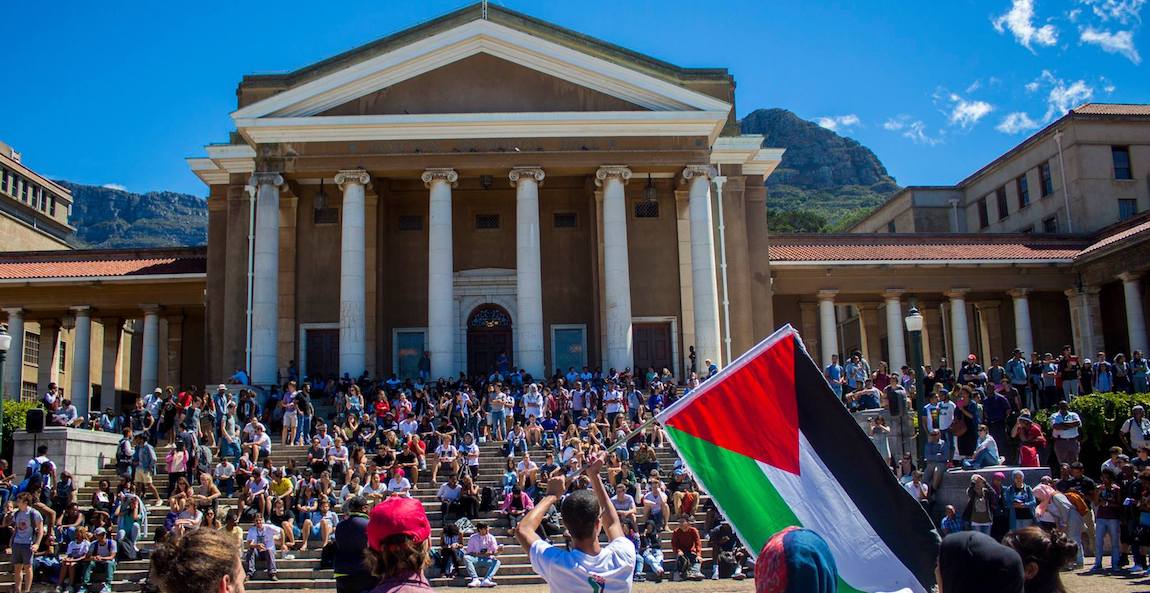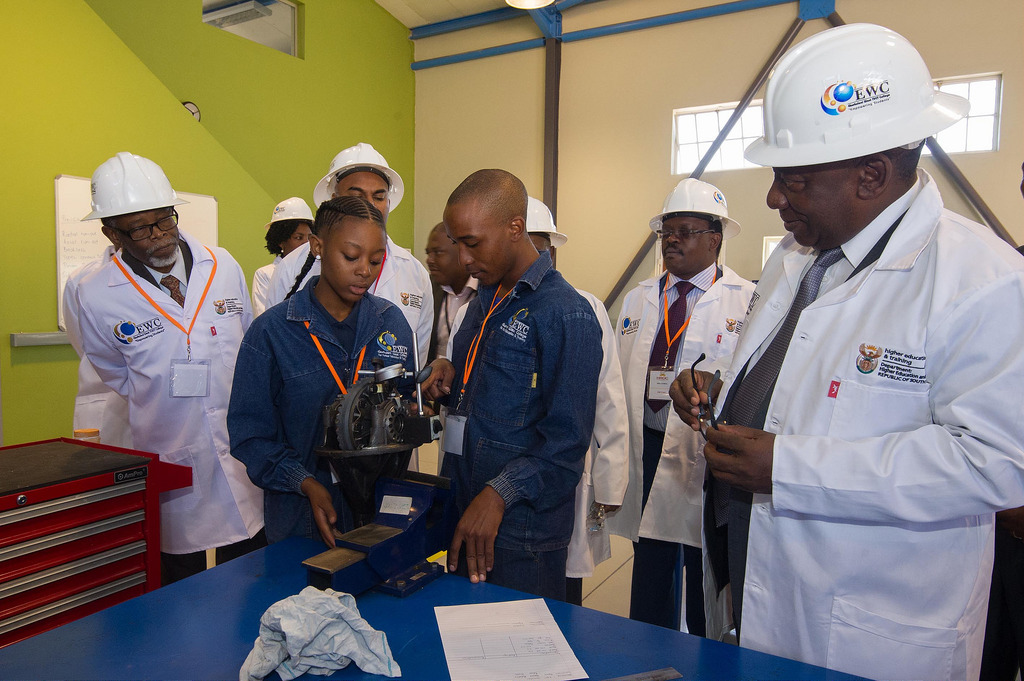NEWS ANALYSIS
On Friday, 21 June, the University of Cape Town closed submissions for comment on its Senate resolution calling for an academic boycott of Israeli universities that enable gross human rights violations in Occupied Palestinian Territories. The resolution’s origins, however, lie deeper.
In 2016, the Palestinian Solidarity Forum (PSF) tabled a resolution to the university’s Academic Freedom Committee (AFC). This resolution is understood to have been more far-reaching than the one we have today. However, a different resolution was formulated by the AFC and put before the Senate. The PSF resolution was not supported by Senate, however Senate did vote on and approve a later resolution by the AFC. It was this resolution by the AFC that was submitted to Council.
The resolution’s arrival at Senate is indeed the culmination of years of growing pro-Palestine sentiments at the university – in the faculties, societies and classrooms across the institution. Debating the AFC resolution was an important litmus test for academic staff in particular, as the discussions fervently moved from the cafeteria, classrooms and plaza into decision making bodies. The vote was a litmus test for the institution too, as academic staff, alongside student representatives, vote to reflect a divided university – the resolution winning 62 – 43 (10 abstentions).
No single narrative permeates across the university. For many detractors of the resolution academic freedom and the inconsistency of not writing similar resolutions for countries that equally occupy and act in contravention of international law. After the Senate vote was won, Richard Falk, former UN Special Rapporteur for the Occupied Palestine Territories and emeritus professor at Princeton University, spoke on the focus on Israel.
“The failure of the UN and international diplomacy to find a solution after seven decades reinforces the positive argument for relying on the role of civil society,” he wrote in an article published by The Daily Vox.
Garnering greater traction among those against the resolution are adamant warnings that it risks academic freedom. “I’m worried that the proposal could have severe implications for academic freedom. I’m generally against academic boycotts because I think they curtail freedom of expression and academic freedom,” Dr Elisa Galgut, senior lecturer in the philosophy department, stressed.
“[Academic freedom] is the lifeblood of a university and therefore the lifeblood of a society because without those discussions you don’t have a free society and we need to be able to tolerate views that we don’t like,” Galgut argued.
Galgut has support in these views as there are other, anonymous, staff who stand against the proposal on similar grounds. Palestinian academics voices their thoughts on academic freedom while urging university support for the resolution. The Palestinian Federation of Unions of University Professors and Employees (PFUUPE) and the Palestinian Campaign for the Academic and Cultural Boycott of Israel (PACBI), while urging support for the boycott, spoke to the concern regarding academic freedom. “We want to reiterate that our boycott call is directed solely at Israeli institutions, not individual academics, and that we hold dear the universal right to academic freedom, on principle and because Palestinians are obliged to fight for it every day, along with our right to education,” they wrote.
Rekgotsofetse Chikane, UCT alumnus and author, spoke to the concern of academic freedom, pointing to its current exercise. “The consideration of the boycott is not an affront to academic freedom. In fact not debating the topic would be a violation of academic freedom. The nuances of what is adopted provides a more interesting question regarding the limits of one’s academic freedom,” Chikane said.
“The fact that [the proposal] found itself at Senate is already mind-boggling, but it does speak volumes about the growing pro-Palestinian feeling on campus,” he said.
In the years since the AFC brought a resolution Senate supporters have rallied behind it in growing numbers and though its victory by vote was a surprise to some, its arrival was always something due. However, to others it’s arrival and subsequent victory in Senate was a surprise – that the litmus test had finally shown its colours.
The South African Union of Jewish Students’ (SAUJS) Western Cape branch opposes the resolution, seeing it as endangering free speech. “UCT and its students will be poorer for it,” they said in response to the chance of the proposal being implemented. “One of universities’ core attributes is the ability to conduct research. Without this a university loses its cutting edge. A boycott by its very nature inhibits research. For this reason a boycott has no place on a university campus,” the organisation said.
UCT’s proposal is the first of its kind, however the old skeletons of funding and donors linger.
“It’s clear that power and money are very important considerations for the university. The university is concerned about the money coming into the university and whether big donors will withdraw their funds if the university supports the resolution for an academic boycott. Although the biggest funder of the university is the South African government, who have taken a particular stance in support of Palestine,” said PSF chairperson Alex Hotz said.
Matthew Davidson, a third-year mechatronics student, believed that some people in the university had become “too caught up with protesting”.
“I can see why it’s important to some people but you’re not going to change the world with the all the small things that you fight about at varsity. I’m finished next year, just like that, and then I’m gone. I believe it would be better to [do well] at varsity, go from there and then save the world. I came here to be an engineer and I can take that skill and help more people than protesting,” Davidson said.
Haanim Jacobs, a second-year psychology student offered support for the boycott but knew little of the proposal itself.
Many academic staff members, including those on Senate, refused to comment, saying that they would prefer to offer their thoughts on record after the process had concluded.
The proposal’s debate and consideration is an expression of academic freedom but where to from there? To some academic freedom’s framing shouldn’t be restrictive but there is always room for interpretation across the spectrum of definitions. The distinction between debating the resolution as an exercise in academic freedom versus the potential restriction of that freedom as a result of the resolution being adopted is a salient one to make. From discussions with further anonymous staff it is revealed that the proposal process went through various iterations over a number of years and that there was significant, robust and heated debate on this issue. The notion of complexity forms part of many of these debates. From the news desk of Trevor Noah’s Daily Show to campuses across the world, Israel/Palestine is often seen as complex. Why? When the Oslo Accords were signed in Egypt in 1993, Israel agreed to the right of Palestinian self-determination – it is ironically self-determination that Israel uses to justify its actions. International law is broken and as more land is encroached upon, a two-state solution looks more like lip-service than anything else. While the world watches, does UCT have the right to act as judge? This is another debate that continues amidst discussion of the boycott.
Instead of acting as judge, Professor Leslie London of the department of public health and family medicine believes that UCT it is acting with a conscience. “[The proposal] is a very specific statement targeting only those institutions that enable the illegal occupation of the Palestinian territories,” London said. “If an institution does not participate in enabling the occupation, no problem. It is in effect asking Israeli institutions to take a stand against the occupation, or, at least, not to facilitate it. That is very far from an academic boycott of Israel. Many academics who supported the Senate resolution, myself included, would not support a blanket boycott of Israeli institutions. But a resolution that moves them to confront injustice in their own backyards is hardly offensive and very supportable,” London concluded.
Consistency is another point and Galgut speaks to it, that if UCT is against gross human rights violations then the institution should be against all gross human rights violations. “We have the Confucius Institute here [at UCT]. The Chinese government is involved in all sorts of hideous things and for UCT to welcome China and Chinese money and then boycott only Israel I think is hugely inconsistent. I wrote to Council saying if you’re opposed to gross human rights abuses, boycott every university around the world that engages gross human rights abuses, why single out one country?” Galgut said. Galgut also believes that the Israel/Palestine conflict is long-standing and complex, and singling out Israel as the sole or main aggressor is hugely problematic and ignores both history and context.
There is a misnomer among some, indeed by some of the respondents as well, that this boycott is a blanket boycott against all Israeli academic institutions. This feeds into misleading antisemitic discourses As Professor London pointed out earlier, if an institution does not enable gross human rights violations then that institution needn’t worry about its relationship with UCT. The boycott is founded on the basis of social justice with intent to aid the Palestinian cause and take action against Israel. Accusations of antisemitism are diversionary and could not be further from the proposal.
There is, crucially, another group whose voices tend to get lost in the chaos of polarisation: those of the undecided. And, as always, this group is large. Thembelihle Ncayiyana, the postgraduate student representative on Senate, believes that the resolution should “undoubtedly” pass. Dr Galgut along with anonymous professors and SAUJS are adamantly opposed.
Whereas people like Ismaeel Abrahams, assistant lecturer at the college of accounting, stands: “I agree with the academic boycott as a means to protest against Israel, but am wary as to the possible backlash that will happen as a result of the resolution being passed. There definitely is a great need to educate the masses as to why this boycott is taking place, otherwise it would aid Israeli support more than anything else.” Abrahams said.
Perhaps this is no time to be undecided but the fact that there are those who believe in action against Israel yet are uncertain of the ethics and effectiveness of an academic boycott must be recognised. George Pearson Smith, the American biologist and Nobel laureate, believes that is the approach to take for the sake of justice but equally the academic freedom of Palestinians.
“‘The Doors Of Learning And Of Culture Shall Be Opened!’ begins one section of the Freedom Charter. That those doors be opened in Palestine is a particular focus of the resolution before you, and of PACBI in general. Israel’s military occupation of Gaza and the West Bank, including East Jerusalem, severely curtails Palestinian academic and cultural freedom,” Smith wrote.
Alongside Abrahams, Belle Marx Mi’ler, a current postgraduate student and UCT debater, is equally unsure as to the sustainability of an academic boycott. “I think academic boycotts are merely one aspect of a myriad of ways to protest against an oppressive state. I don’t think we will see meaningful change if we purely stop engaging with the State Currently Known as Israel in an academic sense. The world needs to take a hard line and impose a variety of boycotts until we see meaningful change. I think academic boycotts is where it becomes difficult to enforce boycotts in a way which do not further disenfranchise already marginalised individuals,” Miller said.
No doubt there are a number of academics who feel this way too and Miller’s point on the need for a variety of boycotts is paramount. However, as an academic institution, economic and other such boycotts lie outside of the university’s field. The university can however use its powers of influence and research prowess to further the cause of other boycotts too. Regardless, the indecision of some calls for the Council to be decisive.
And what of the proposed boycott’s effects? While we wait for Council, we can only predict. Muhammad X, an anonymous alumnus pursuing a PhD in America, said, “It would be interesting to see how this proposed academic boycott would really affect UCT and its work as a research institution. I don’t know how many partnerships UCT has with Israeli institutions. But this would be an ideal time to reshape our focus and create partnerships with other South African universities or universities on the African continent,” X said.
The three narratives – the two contrasts and those suspended in the middle – presented herein form only the ‘major’ sentiments toward the boycott. We should, however, take lessons from this proposed boycott and the consultative process that it has engendered – that what we think matters and, if we would have it heard, our voices matter too. We should know that in a climate of political insulation and polarisation the strength of self it takes to voice one’s opinion is often relative to how many you share it with but we should know too that your opinion will only impact and shape the world if you share it.
Featured image via the UCT Palestine Solidarity Forum









